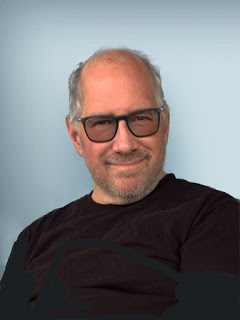Barry Wittenstein is the author of the new children's picture book The Day the River Caught Fire: How the Cuyahoga River Exploded and Ignited the Earth Day Movement. It focuses on the fire on the Cuyahoga River in Cleveland in 1969. Wittenstein's other books include Oscar's American Dream. He lives in New York City.
Q: What inspired you to write The Day the River Caught Fire?
A: I remember hearing Randy Newman’s song “Burn On” in 1972. I could not believe a river had caught fire. I quickly learned it was not satire, as many of Newman’s songs are. Fast forward 50 years, and I wanted to write a narrative nonfiction picture book about climate change and pollution. I remembered the song.
Q: What do you think Jessie Hartland’s illustrations add to the book?
A: Jessie’s illustrations are fabulous. They elevate the story into an entirely new stratosphere. Kids will find it easy to “get into the story” because her art feels familiar and inviting. Jessie’s images perfectly complement an otherwise deadly-serious tale.
Q: The Kirkus Review of the book says, in part, “But despite ending the main narrative with an optimistic observation that the river is clean enough today for fish to survive in it, [Wittenstein] closes with an author’s note that offers a strong reminder that pollution and climate change remain deadly challenges…” What do you think of that description, and what do you hope kids take away from the book?
A: I’m glad Kirkus noted that. Yes, it would have been easy to write a bland author’s note. "Dirty river becomes clean river. The end." I hope my note rallies the troops. It’s a call to action. It’s a warning that while the Cuyahoga is clean, so much more still needs to be done worldwide.
Q: How did you research the book, and what did you learn that especially surprised you?
A: When I began my research, I was ignorant of the entire subject. It was just a germ of an idea.
I spoke to David Stradling, urban and environmental history professor at the University of Cincinnati. I read his book, Where the River Burned: Carl Stokes and the Struggle to Save Cleveland. David was an invaluable resource.
Much of my research took place online—videos and documentaries on YouTube. I signed up for a subscription to the Cleveland Plain Dealer to read their coverage as it happened in 1969.
Part of the fun of writing nonfiction books is learning about the subject and finding kid-friendly facts.
I did not understand the timeline of the Cuyahoga and its impact on Earth Day. I had no clue that Cleveland’s Mayor Stokes was instrumental in helping push the subject into the headlines.
I didn’t understand that because the 1969 fire was extinguished almost as soon as it began, and no photographers could get there in time to take pictures, whatever photos do exist are from previous Cuyahoga river fires.
And I certainly had no clue that other rivers around the nation had also burst into flames.
Q: What are you working on now?
A: Nancy Paulson just signed a narrative nonfiction picture book biography for a 2025 release. A musical, theatrical production of my 2020 book, Oscar’s American Dream, is being produced by the Orlando Repertory Company in Florida. I’m keeping my agent, Mona Kanin, busy with new material on various nonfiction topics.
--Interview with Deborah Kalb. Here's a previous Q&A with Barry Wittenstein.


No comments:
Post a Comment